By now, you must have binge-watched the hit Netflix show You and been both horrified and captivated by its protagonist Joe Goldberg. Joe starts off as a charming and affable sort with a penchant for falling wildly in love with various women. But as the show progresses, you realize that all is not well with our hero. Joe exhibits some truly appalling (and illegal) ways to keep his women under his control. So, you may wonder, is You all about dating a sociopath?
Is it true he has no conscience? And should we be concerned if the people in our lives suddenly look a bit more like Joe than they should? What is the definition of a sociopath? Let’s learn about sociopathic behavior in relationships with the help of Jui Pimple (M.A. in Psychology), a trained Rational Emotive Behavior therapist and a Bach Remedy practitioner specializing in online counseling.
What’s A Sociopath?
Table of Contents
Jui explains, “A sociopath is a term used for someone with antisocial personality disorder (ASPD) or showing behaviors that are antisocial. The typical features of sociopaths in relationships are poor code of conduct, lack of emotions like empathy toward others, remorse, and guilt for causing damage to others. They often break laws, disregard others’ property or safety, and show aggressive and reckless behaviors toward others or their properties. They will damage others with the intention to hurt or harm them.”
According to the DSM-5 (The Diagnostic and Statistical Manual of Mental Disorders), the terms ‘sociopath’ and ‘psychopath’ refer to someone who lives with an antisocial personality disorder. ASPD is medically defined as a mental health condition where a person shows a “consistent disregard for rules and social norms and repeatedly violates the rights of others.”
On a clinical basis, there is no definite distinction between sociopathy and psychopathy. Rather, a professional will use these terms to distinguish between and interpret the types of behaviors that are present under this condition. Sounds confusing? Let us explain.
Related Reading: 11 Warning Signs Of Lack Of Emotional Connection In Relationships
Signs of sociopathy
If we understand that antisocial personality disorder involves a persistent pattern of disregard for social and interpersonal norms, then sociopathic behavior in relationships could include any or all of this:
- A person who ignores the law or breaks rules persistently at work or in social situations
- Someone who oversteps social boundaries and completely disregards the other person’s rights. This could include stalking, destruction of property, or stealing
- A gaslighting sociopath who regularly manipulates others for personal gain and is dishonest and deceitful
- Someone who acts without considering the consequences of their actions and are self-serving
- A person who is overly aggressive and gets into physical fights and verbal abuse
- Someone with difficulties controlling their impulses and managing responsibilities
- Someone with no guilt or remorse over their actions
- Someone with no concept of safety and social norms for themselves or others around them
Most people with this type of personality disorder are not interested in the lives and feelings of others. Their self-centeredness can make them come across as overly superior and arrogant. So, can a sociopath fall in love? Sure, they can! In fact, they can be extremely charming and can use their intelligence and humor to manipulate others into falling in love with them. What they feel changes from case to case and leads to the question — can a sociopath change?
There are some sociopath traits that can present differently depending on gender. This is not to say that one gender is “more sociopathic” than another but rather refers to the degree of certain traits. For example, sociopathic men in relationships tend to be more aggressive and violent than women. Women with sociopathic tendencies have shown higher instances of argumentative behaviors and traits such as excessive moodiness and irritability. Female sociopaths and cheating tendencies go hand in hand. Women with sociopathic behaviors may also be more emotionally manipulative, leading to complaints like, “My girlfriend lacks empathy,” whereas men could exhibit more dominant and overt traits.
What causes sociopathy?
Sociopathy is often considered a result of the environment and upbringing rather than a genetic trait (as compared to psychopathy, which is largely linked to biology and brain chemistry). While some inherited traits may be involved, factors such as how they were raised, childhood trauma, abuse, violence, and conflict with caregivers could give rise to characteristics of sociopaths. There is another field of study researching the connection between mental health conditions and degenerative diseases such as dementia that could lead to antisocial personality behaviors, but that is a whole different topic entirely.
Jui explains, “Like other personality disorders or psychiatric disorders in general, there is no specific cause to sociopathy. There could be an interplay of multiple factors, such as genetics, social environment, parenting style or parental attachment, traumatic events, and injuries to certain parts of the brain. Sometimes, not getting adequate care and love in childhood or being a victim of childhood abuse and violence can lead the child into becoming a rebellious or impulsive person who may become a sociopath.”
Treatment of sociopathy
The inherent problem with conditions such as sociopathy is that people living with these behavioral issues rarely recognize the problem. As a result, sociopaths in relationships do not seek professional help unless forced. Some treatments for ASPD may include:
- Psychotherapy
- Anger management treatment
- CBT (cognitive behavioral therapy)
- Therapeutic counseling groups
- Mentalization-based therapy
But, can a sociopath change? Unless the person concerned wants to put in the effort and willingly wants to make a change, none of these therapies will be successful. Jui urges the person to consider “psychotherapies, medications, and support from family and others.” She adds, “Most important at any of the sociopath relationship stages is the awareness and insight that something is wrong within and needs to be cured.”
Related Reading: Emotional Baggage – Causes, Signs, And Ways To Cope
18 Warning Signs You’re Dating A Sociopath
Look, we are not saying that every date who is self-absorbed or argumentative is a highly functional sociopath. Some people are exploitative and rebellious but don’t necessarily justify being called by strong terms such as ‘psychopath’ or ‘sociopath.’ Keeping this in mind, there are signs that can answer your question, “Am I dating a sociopath?” It’s better to note if these instances are occurring on a consistent basis before labeling anyone.
According to experts, here are 18 signs that you may be dating a sociopath:
1. They lie. A lot
A person with sociopathic tendencies lies about everything. They lie if they want their way or to gain control over a situation. Sometimes, they lie just because they can. Jui says, “Lies are common things sociopaths say and with no feelings of guilt or regret.” Chronic lying in a relationship is a surefire sign that things are not what they seem and the person you are dating may have underlying personality issues.
2. They rebel against rules
What seemed ‘cool’ and ‘anti-establishment’ at first soon becomes worrisome and harmful. Your typical ‘bad boy’ or ‘bad girl’ behavior can lead to some very dangerous and violent situations, and your safety could also be at risk. Jui adds, “If you ask yourself, “Am I dating a sociopath?” look out for their tendency to break various social rules and laws and do so with pride. Breaking rules occasionally is different, but when it becomes routine behavior, it could be a sign of sociopathy.”
3. Their arrogance is unfounded
Sociopaths in relationships come across as exceedingly confident and egotistical. Their sense of self is highly inflated, and they show off their superiority vis-a-vis others around them. Their facial expressions, body language, and attitude all reek of superiority.

4. They are known for their impulsive behavior
This may sound familiar if you have ever made plans with someone who constantly lets you down, irrespective of how you feel. True sociopaths are impulsive and don’t care about other people’s feelings. They want to control any situation. So, to plan ahead and commit may be unacceptable.
Related Reading: 15 Signs An Emotionally Unavailable Man Is In Love With You
5. They are very charming
Not every charming person you meet is a sociopath cheater, but every sociopath inevitably uses charm to manipulate their way into your life. “They are usually very attractive or charismatic,” says Jui, adding, “At the surface level, they are very charming, and you feel strongly attracted toward them. They will also move very fast in a relationship for which the hidden motive would be to gain control over a partner.” If your partner can charm strangers with love bombing, be the life of the party, and later exploit people and use them, red flags are waving wildly in your face. Pay heed.
6. Your relationship is moving way too fast
Sociopath relationship stages move very fast. A manipulative sociopath goes in for the figurative ‘kill’ in no time at all. They may plan your future together on your second date and propose soon after. What upsets a sociopath is lack of control. They use these tactics to hook you with their charm and plan a picture-perfect future without giving you the time to see through the lies and deception.
7. They use guilt to get their way
In a relationship with a sociopath, you will often find yourself being guilt-tripped into behaving in a particular way. They use whatever means necessary to get their way. What upsets a sociopath is not having control. Sometimes this may include using your nurturing instinct and empathy to their advantage.
8. The relationship can turn abusive
Most sociopaths feel uncontrollable rage and have anger management issues. Sociopaths are jealous in relationships as well. This, combined with uncontrollable rage and an argumentative nature, can lead to emotional (and even physical) abuse. Your fear is then used as another manipulative tool to control the situation.
9. They manipulate every situation to their advantage
“If your partner is manipulating you by using their charm or emotional tactics to fulfill their demands, you may be dealing with a sociopath,” warns Jui. They woo people with their charm and wit and are usually considered trustworthy. Once a person has fallen prey to their charms, their manipulative side comes into play, and they quickly identify and rely on taking advantage of the person’s flaws and weaknesses.
10. They love to play the victim
If things are not going their way, and your partner suddenly pulls out the victim card, be aware that they may be pretending to be helpless or wronged only to get their way. One of the common things sociopaths say is that everyone is against them and hates them. All this may be done to cement your support and love.
11. Infidelity is not unusual
A relationship with a sociopath may be fraught with serious issues, such as cheating and infidelity. A monogamous healthy relationship is often impossible for a sociopathic personality as what attracts a sociopath is the thrill of the chase and the feeling of being in control. Remember, they refuse to play by any rules and disregard the meaning of loyalty and commitment altogether. As a result, most of their relationships are usually short-lived.
12. Sociopaths lack structure in their lives
Reports indicate that people who struggle with sociopathy are more susceptible to drug or alcohol abuse. Unemployment may also be an issue. They are usually self-absorbed and uninterested in the lives of others as well as their impact on others’ lives.
13. Sociopaths lack empathy
Sociopaths lack the ability to empathize. They rarely consider another person’s feelings or recognize or feel guilty for the hurt they cause. This may be because it’s hard for people with sociopathic tendencies to see things from another person’s perspective. In their quest for power and control, they rarely acknowledge the feelings and problems of others.
14. They disrespect boundaries
A sociopath does not understand the meaning of the word ‘no’. They will not accept anything that is not going their way and will do everything they can to manipulate a situation to their advantage. This may involve disrespecting your boundaries, – either emotionally or physically, – until they get their way.
Related Reading: Dismissive-Avoidant Attachment: Signs, Causes, And Ways To Overcome
15. They do not have close relationships
While at first, your partner may impress you with their charm and ease of making friends, it will soon become apparent, that they have burnt many of their bridges and rarely have any close friends. This is because of their lack of empathy and ability to connect closely with other people.

16. They refuse to change
If your partner refuses to see their part in a problem and never changes their behavior, you are looking at pretty classic sociopathic tendencies. A sociopath refuses to accept any consequences of their actions and will continue to violate boundaries and disrespect others. No matter how many times they are told that they need to change.
17. They are revenge-seeking
A classic sociopath is vindictive and revengeful. They hold grudges and seek ways to get revenge for a long time. If you get on their wrong side, they may seem charming. But be assured they are planning an adequate ‘punishment’ for months to come.
18. They don’t consider their part in any conflict
It is always someone else’s fault. Most often yours if you are dealing with a sociopath. Your feelings are always left invalidated, and if you do not accept responsibility for your part in the conflict, there may be abuse.
The Effects Of Being In A Relationship With A Sociopath
The effects of being in a relationship with a sociopath can vary from person to person. Professional support may be recommended when a family, a loved one, or even a coworker is dealing with a sociopath. All said and done, if you are or have been in a relationship with a person with sociopathic personality disorder, the effects on yourself can be long-lasting. There is inevitably some form of abuse involved, which can be traumatic. Other effects of dating a sociopath include:
- Low self-esteem
- Poor mental health
- Being isolated from friends and loved ones
- Issues at work due to relationship problems
- PTSD
- Trauma bonding
- Depression
- Anxiety attacks
- Anger management issues
- Lack of trust in others
- Intimacy issues
So, how to be in a relationship with a sociopath? Well, when your own mental and physical health is at stake, any relationship does more harm than good. If there is abuse of any kind, consider getting professional support and advice about leaving the relationship safely.
Related Reading: How To Overcome Codependency In Relationships
How To Protect Yourself When Dating A Sociopath

If you find yourself in a relationship with a sociopath and still want to continue with the relationship, it may help to do the following:
- Understand what you are dealing with: Educate yourself about the condition. Read up about the disorder and be aware of what you are dealing with. Make your peace with the fact that your emotions, feelings, and perspective may never be understood. And make informed decisions regarding the future of your relationship.
- Learn how to safely maneuver the situation: Explain how their behavior affects you and others around them. Learn to establish clear-cut boundaries about your emotional and personal safety and not feel guilty about doing so. When you understand why a person behaves in a particular way, it can help you react and act accordingly. Never underestimate the sociopathic disorder you are dealing with and always keep your safety a priority.
- Look out for yourself: Support your partner during their therapy but also prioritize your own needs. You may also benefit from attending marital counseling or family therapy sessions. You may also join support groups. Your personal journey with a professional therapist can help you improve your communication skills, build your own coping mechanisms, recognize your partner’s manipulative tactics and anger issues, and help you work on an exit plan if the relationship turns abusive or unsafe.
Key Pointers
- Sociopathy and psychopathy fall under the broader condition termed antisocial personality disorder
- A sociopath can be identified by several specific behavioral traits, such as a tendency toward aggression, manipulation, and control
- Dating a sociopath can be challenging and risky. If you persist in such a relationship, it is recommended that you seek professional support to maintain your personal boundaries and safety
- Recovering from a relationship with a sociopath can take time and effort
- A sociopath can only be treated if they recognize the problem within and want to change. Without this, even professional therapy is meaningless
There is no hiding from the fact that living with a sociopath is a challenging prospect. If you insist on staying in such a relationship, the only way to protect yourself is to seek professional support and ensure that your safety and needs are being met. Just so you know, skilled and licensed counselors on Bonobology’s panel are always here for you.
Other than this, patience, understanding, and boundaries must be your watchwords going forward. And remember, if there is ever any instance where your personal safety or the safety of your loved ones is at risk, it is necessary to remove yourself from the situation immediately.
FAQs
If you are struggling with the confusing terminology, just know this — sociopaths tend to be more manipulative and calculating and have no regard for the pain and feelings of others. Jui explains, “They, in fact, may even derive pleasure from their acts.”
5 Signs Of Emotional Abuse You Should Watch Out For Warns Therapist
Manipulation In Relationships – 11 Subtle Signs You Are A Victim
How To Deal With Someone Who Blames You For Everything — 21 Sensible Ways
Your contribution does not constitute a charitable donation. It will allow Bonobology to continue bringing you new and up-to-date information in our pursuit of helping anyone in the world to learn how to do anything.



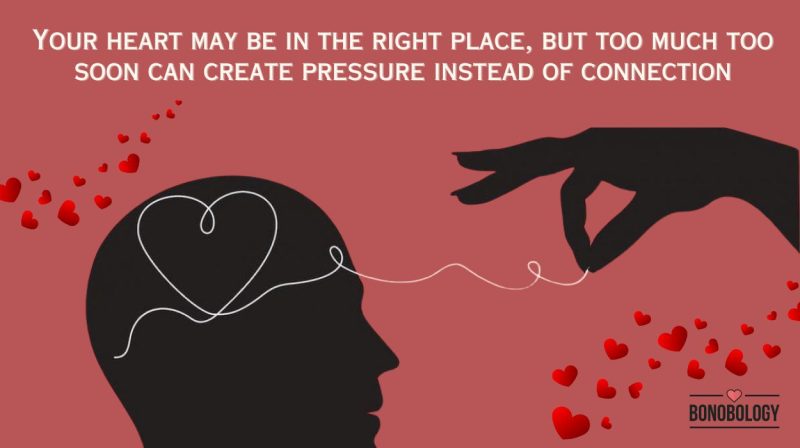










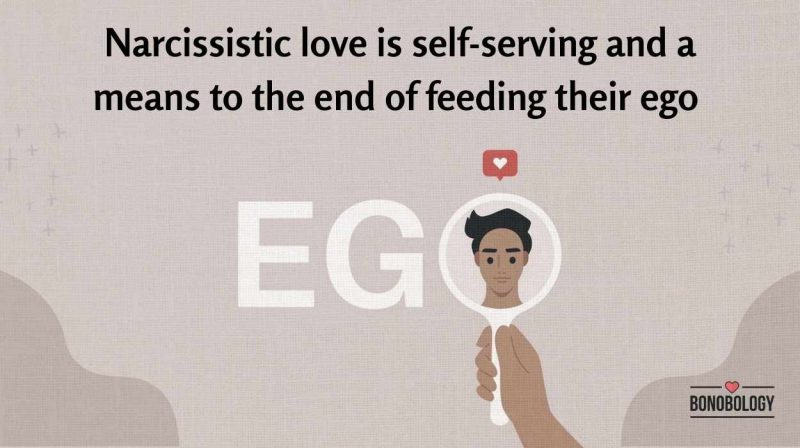

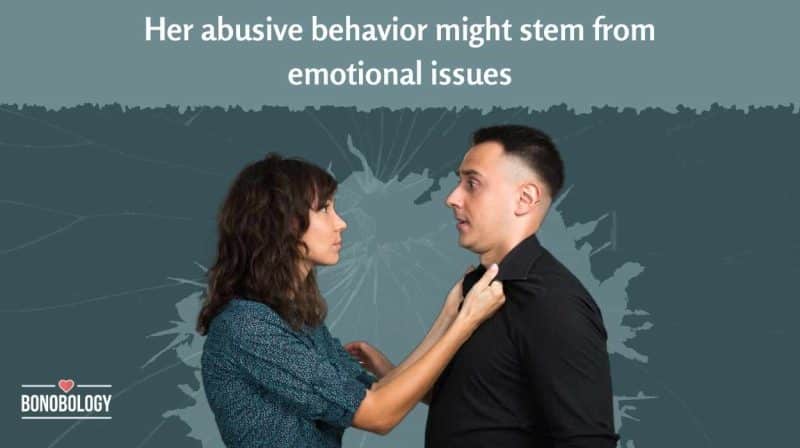
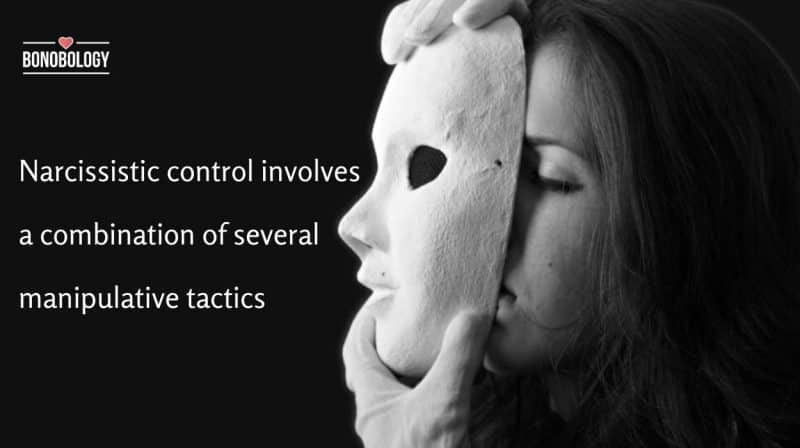



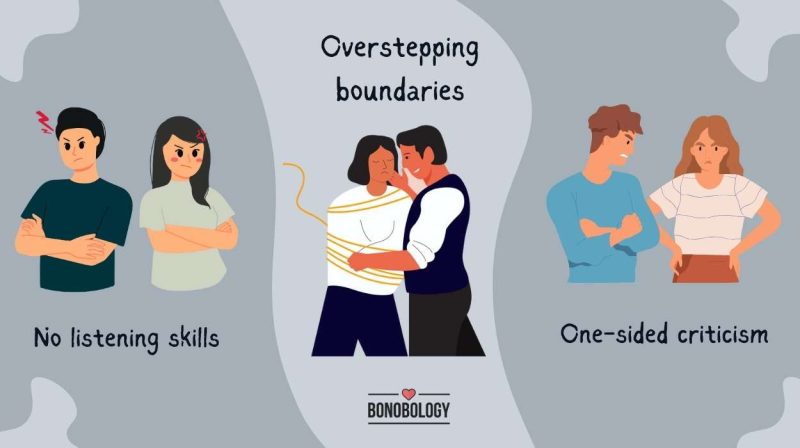
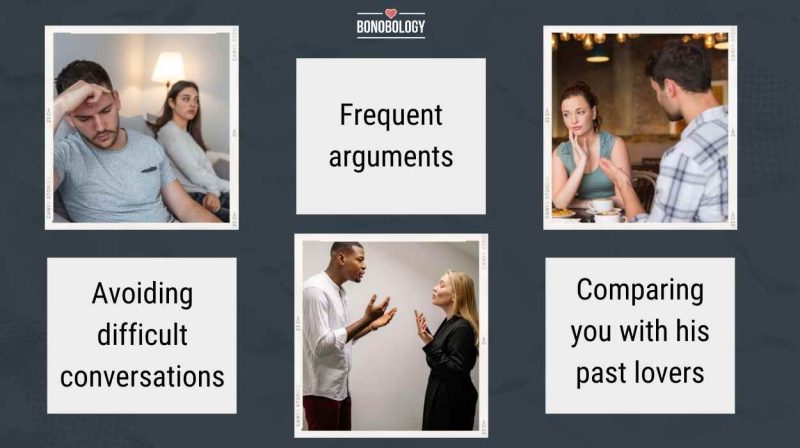
Featured
Unintentional Love Bombing: 9 Ways You May Be Overwhelming Your Partner
13 Signs Of A Hot And Cold Relationship & How To Break The Pattern
21 Subtle Signs You’re Not Really In Love With Your Partner
I Hate My Girlfriend: Why You Feel This Way And What To Do
When Health Challenges Affect Your Relationship Dynamics
5 Harsh But True Signs He’ll Never Marry You
21 Signs That You Are Alone In A Relationship
11 Situationship Red Flags You Should Know About
Why Do I Get Attached So Easily? 9 Possible Reasons and Ways to Stop
How To Respond To DARVO: Expert Lists 7 Strategies
What Is Fexting, And Why Is It Bad For Your Relationship?
Are Narcissists Capable Of Love?
11 Prominent Male Narcissist Traits to Watch For
Why Does My Girlfriend Hit Me? Expert Shares 11 Possible Reasons And Ways To Cope
How Does A Narcissist React When They Can’t Control You?
“My Anxiety Is Ruining My Relationship”: 6 Ways It Does And 5 Ways To Manage It
13 Distinctive Traits Of Female Narcissists Revealed
Recognizing The 13 Red Flags Of A Controlling Relationship
What Are The Examples Of Narcissistic Behavior In A Relationship?
11 Signs He Is Forcing Himself To Love You